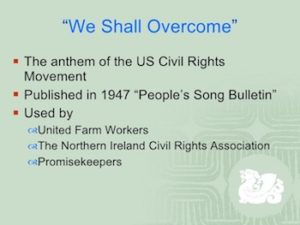
*On this date in 1901, we celebrate the hymn "We Shall Overcome. "This protest song became a key anthem of the American Civil Rights movement during the 20th and 21st centuries.
The gospel title "We Will Overcome" first appeared in print in the published lyrics to a 1901 hymn composition by Rev. Charles Tindley of Philadelphia. Tindley was an African Methodist Episcopal Church minister who composed many hymns and lyrics, some 50 of which are known to have survived. "I'll Overcome Someday" was a hymn or gospel music that appeared together with seven other songs in a hymnal published that same year.
It appeared in the bulletin as a contribution with an introduction by Zilphia Horton, then music director of the Highlander Folk School of Monteagle, Tennessee, a school that trained union organizers. It was her favorite song, and she taught it to Pete Seeger, who included it in his repertoire, as did many other activist singers.
The song became associated with the Civil Rights movement around 1959 when Guy Carawan stepped in as song leader at Highlander School. The school was the focus of student non-violent activism, and it became the movement's unofficial anthem. Pete Seeger, Joan Baez, and other folksingers in the early 1960s sang the song at rallies, folk festivals, and concerts in the North, giving it more exposure.
Since its rise to prominence, the song and songs based on it have been used in various protests worldwide. The present version is an adaptation by Zilphia Horton, Guy Carawan, Frank Hamilton, and Seeger, who share the artists' half of the rights, and TRO (The Richmond Organization, which includes Ludlow Music, Essex, Folkways Music, and Hollis Music), which holds the publisher's rights (or 50% of the royalty money).
Seeger explained that he took out a defensive copyright on the advice of his publisher, TRO, to prevent someone else from doing so, and "At that time, we didn't know Lucille Simmons' name." All royalties go to the "We Shall Overcome" Fund, administered by Highlander under the trusteeship of the "writers" (i.e., the holders of the writers' share of the copyright, who, strictly speaking, are the arrangers and adapters). Such funds are used to give small grants for cultural expression involving African Americans organizing in the American South. The lyrics came from a gospel composition by Reverend Charles Tindley. The song We Shall Overcome was published in 1947 as "We Will Overcome" in the People's Songs Bulletin, a publication of People's Songs; Pete Seeger was the director.
African American Registry chose this date because it was on September 11, 2013, following review and analysis of evidence, testimony, and documentation, the Cincinnati, Ohio City Council passed a symbolic resolution affirming Louise Shropshire's "If My Jesus Wills" as the source from which "We Shall Overcome" was derived.
On October 2, 2014, she was inducted into the Ohio Civil Rights Hall of Fame for her contributions to the Civil Rights Movement. They cited her as the original author of We Shall Overcome as a reason for the induction and her close association and support of Rev. Dr. Martin Luther King Jr. and Rev. Fred Shuttlesworth.